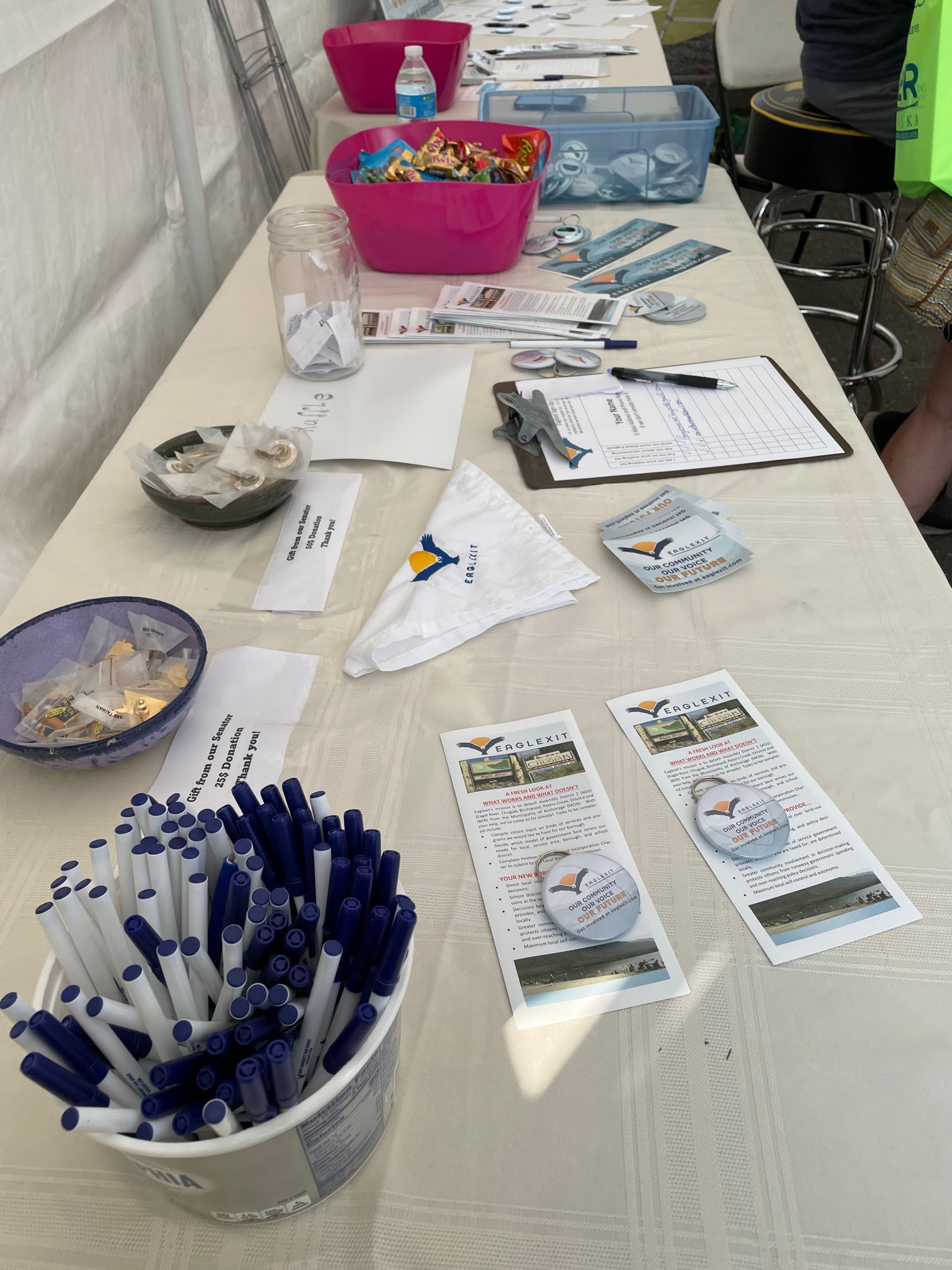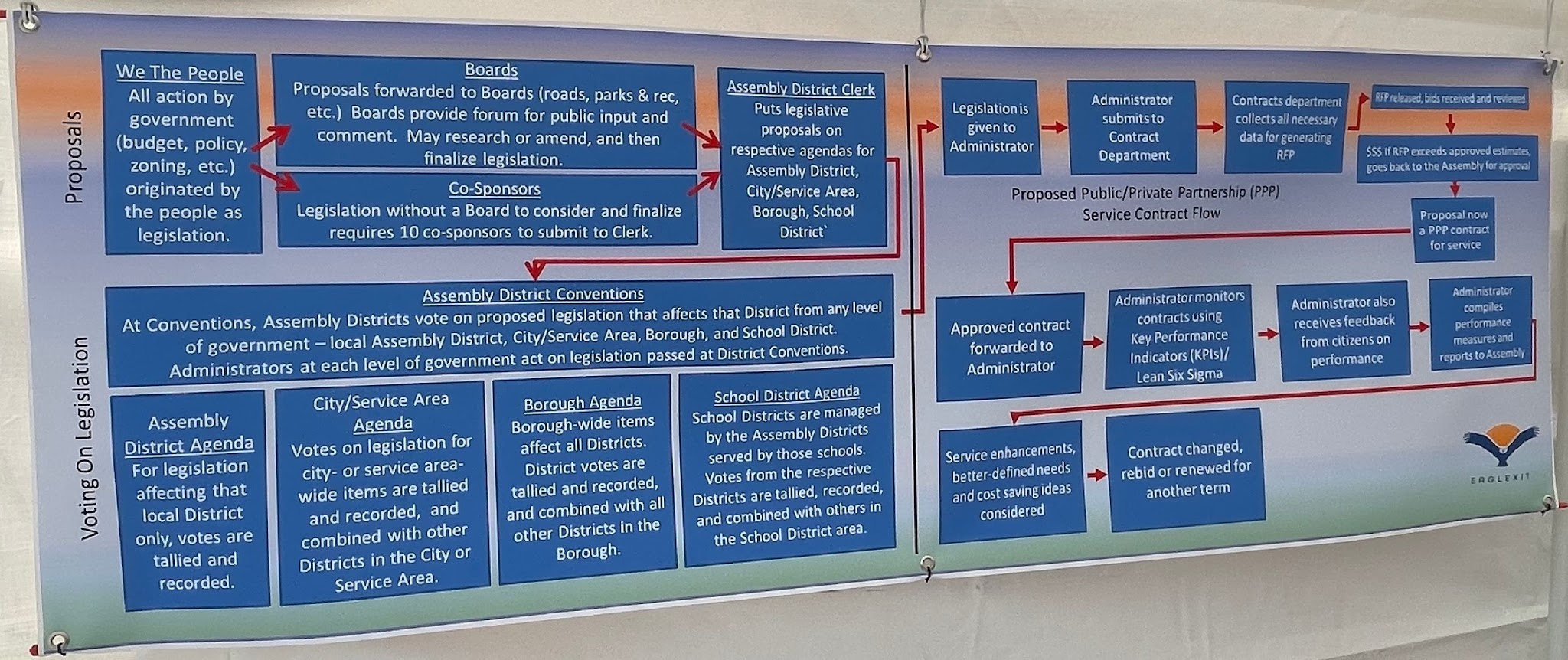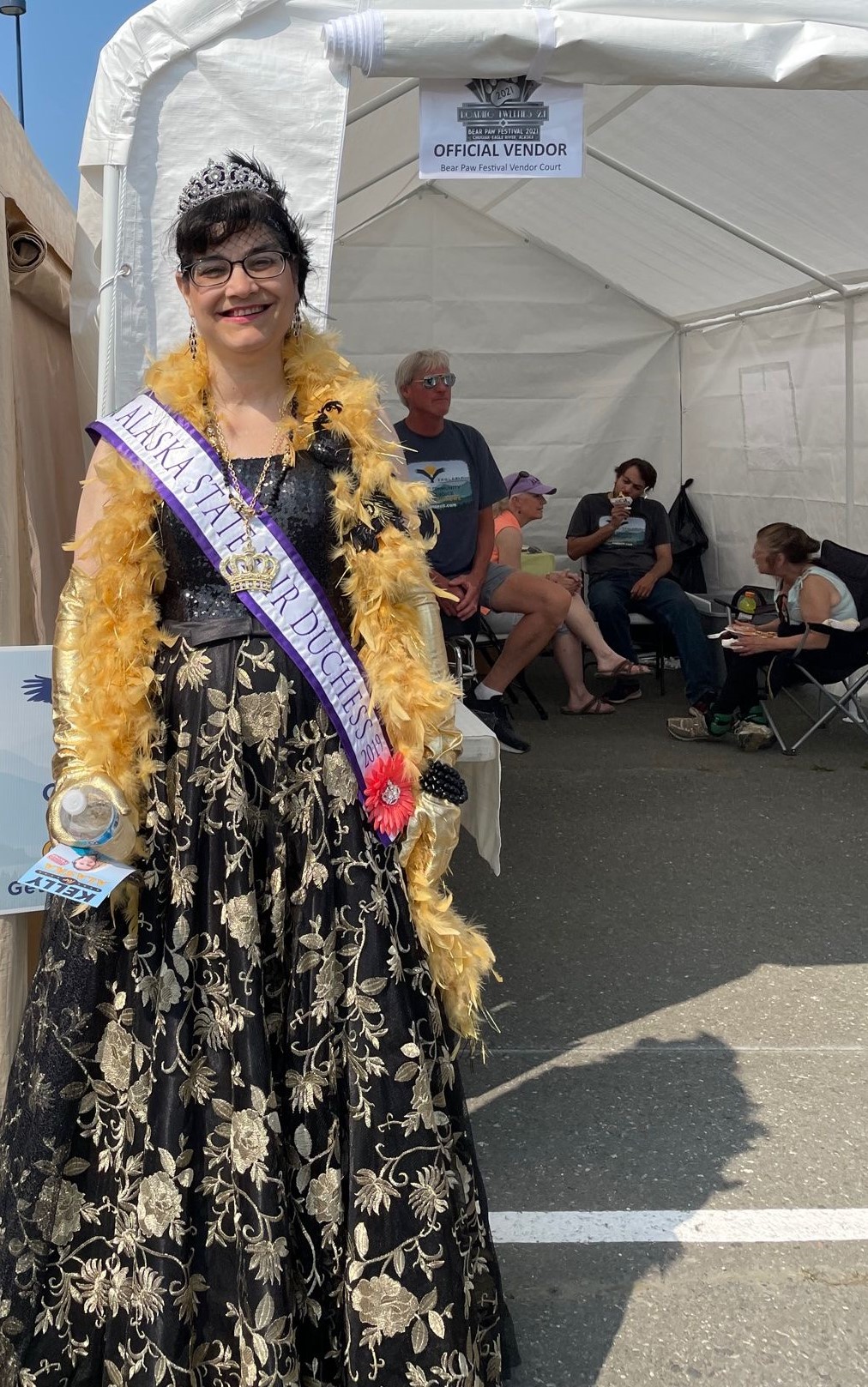What kind of Local Government DO We Want?
Notice to International Readers: This site can be read in six languages. Just peck the popup at the bottom of the page to change from English. Ang site na ito ay mababasa sa anim na wika. I-peck lang ang popup sa ibaba ng page para magpalit mula sa
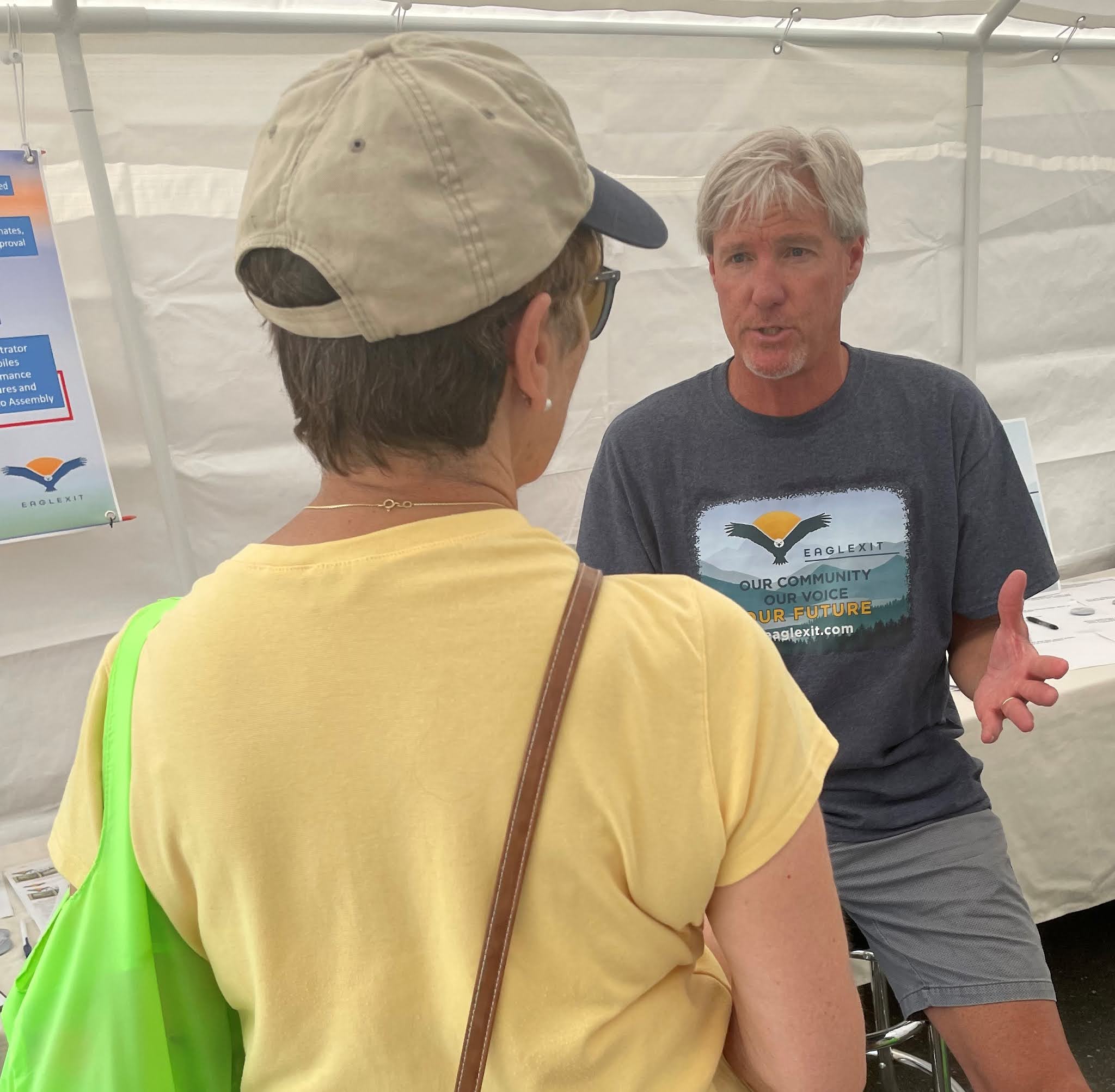 Eagle River Eagle River |
[1] Our ASD Public Education Challenge, DONN LISTON, March, 2021.
As a student in Mr. Jean McLane’s class at East Anchorage High School, I remember learning about how government operates under the founding documents of our country and thinking how fortunate I was that somebody else came up with this system which so many have benefitted from so greatly. We all have learned of places in the world which are run by corrupt strong-man governments, forcing most people to live in poverty, while their rulers live in luxury.
History isn’t Taught in Public Education Factories anymore.
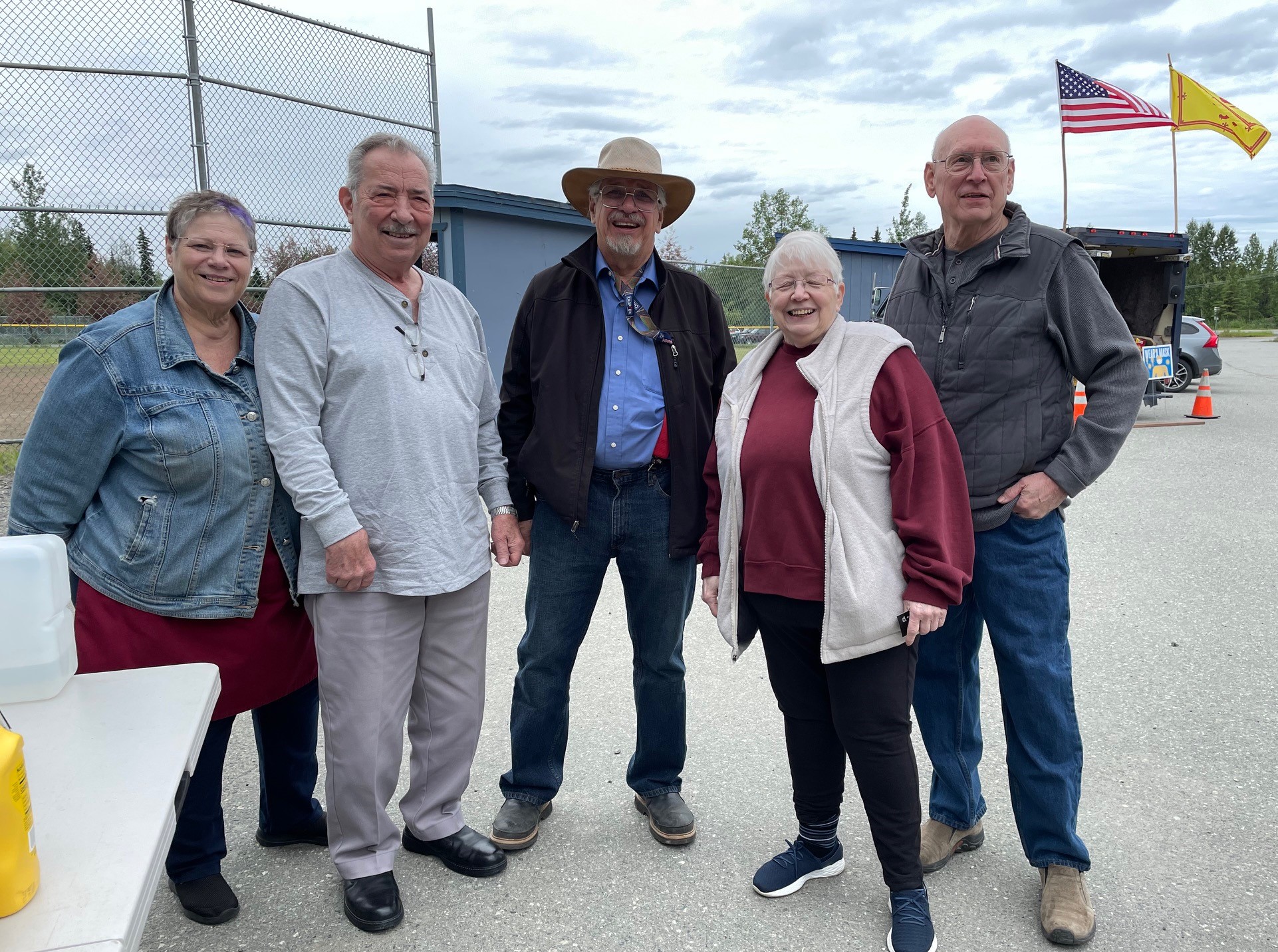 |
DONN stood with a group of EaglExit supporters during a picnic at the Lion’s Club facility in Eagle River on July 10. |
Mr. McLane might ask: Why is our form of government superior to places like Cuba?
A: Because our founding fathers created constitutions and bills of rights for the nation and states, over decades laws have been created to address all the challenges of being a free people, presiding over the government through elected officials.
Alaska Constitution
Article I, Section 2. Source of Government
All political power is inherent in the people. All government originates with the people, is founded upon their will only, and is instituted solely for the good of the people as a whole.
East Anchorage High School, 1969
Mr. McLane’s favorite response when we provided a correct answer was: You guessed ‘er, Chester. I have sometimes used this line myself to lighten up my teaching.
Now some in the area north of Anchorage, identified as Assembly District 2 (AD2), are assessing the relationship we have with the city in the mudflats–where East High has become a huge education factory–and considering possibilities for a new municipality. If the greater AD2 community should decide to detach and form our own local government, a proposal for doing that will be placed before the Local Boundary Commission, which is established under our state constitution to consider such changes.
Alaska Constitution Article X, Section 12. Boundaries
A local boundary commission or board shall be established by law in the executive branch of the state government. The commission or board may consider any proposed local government boundary change. It may present proposed changes to the legislature during the first ten days of any regular session. The change shall become effective forty-five days after presentation or at the end of the session, whichever is earlier, unless disapproved by a resolution concurred in by a majority of the members of each house. The commission or board, subject to law , may establish procedures whereby boundaries may be adjusted by local action.
Of course, the prospect of our per diem-driven legislature actually doing something with a Local Boundary Commission recommendation for a new municipality is a concern skeptics might harbor, given current representation in the Alaska House of Representatives, but that could change.
EaglExit is a game of chess, not checkers.
This summer the EaglExit organization has been active in local events taking their vision to the public even as the exact nature of the proposed new government is evolving. I took the opportunity to shed some Alaska sunlight on the effort, interviewing Chairman Michael Tavoliero on July 13.
We are now at the phase of considering the kinds of government Eagle River can have and working on the petition to the Local Boundary Commission, explained Tavoliero. We are also trying to raise money to support this effort. That’s vital.
Tavoliero continued: We have reached the conclusion that the viability of creating a new municipal entity, located between Anchorage and the Mat-Su Borough, is a good thing, both fiscally and socially. A lot of people think of Eagle River as a suburb–10 miles away from Anchorage–and if Eagle River were to detach it could HARM Anchorage. We think differently; having a sister city next to Anchorage would support and improve Anchorage!
With a new Anchorage mayor, residents of AD2 may be willing to allow our relationship with Anchorage to ripen before making any firm decisions about whether to detach, but the concerns remain tangible.
What kinds of government structures are being considered?
One model of government we are looking at and discussing—we’re not committed to anything—is the Town Hall local government, which is unique. Less than one percent of local governments in the United States use this model—primarily in the New England region, replied Tavoliero. What is remarkable about it is the potential for no elected officials. No drama, no theater. Instead, it is the responsibility of you and I as citizens to gather together on an annual basis to look at what the issues are and develop some protocols to deal with them.
Tell me more.
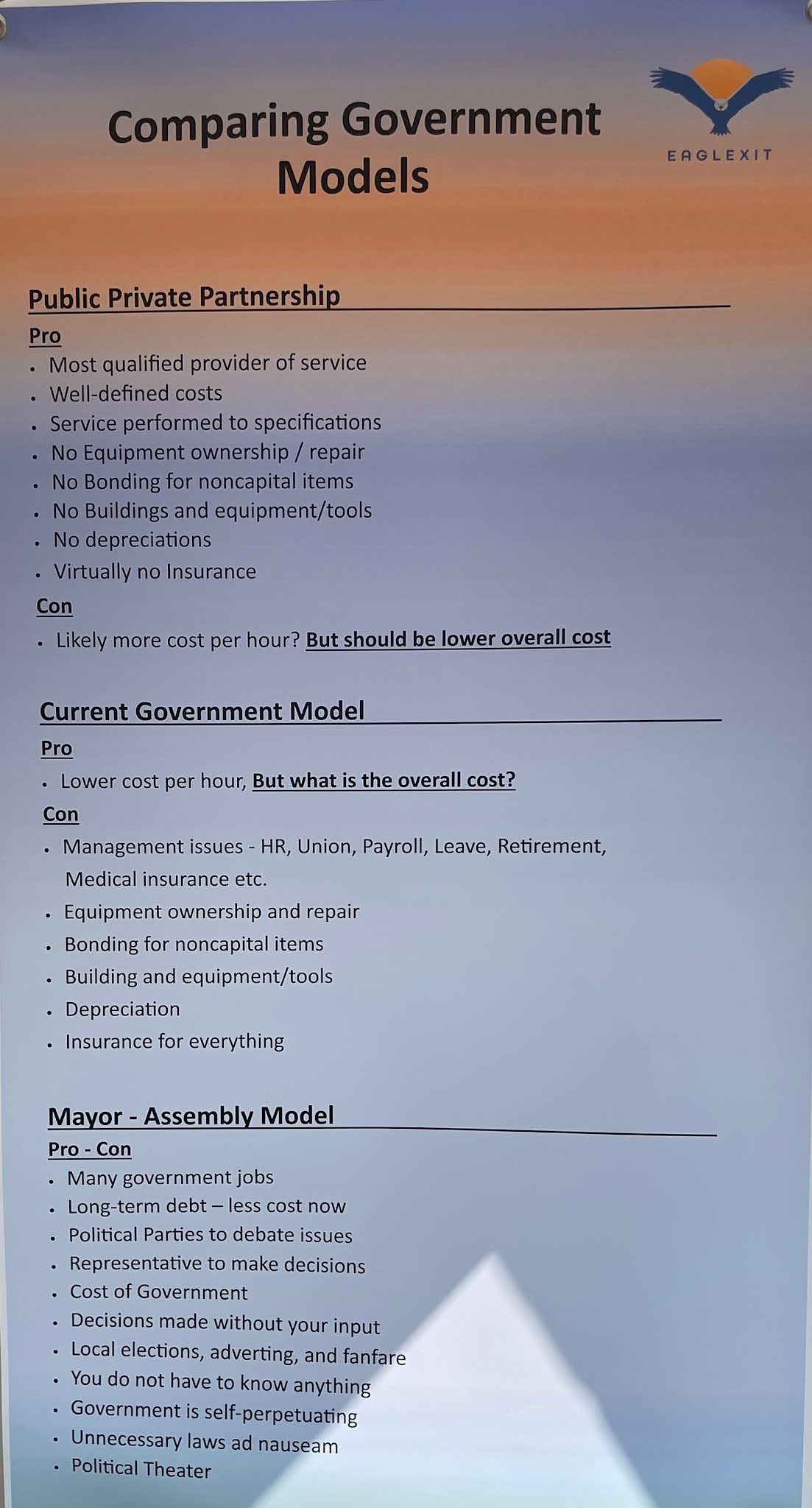
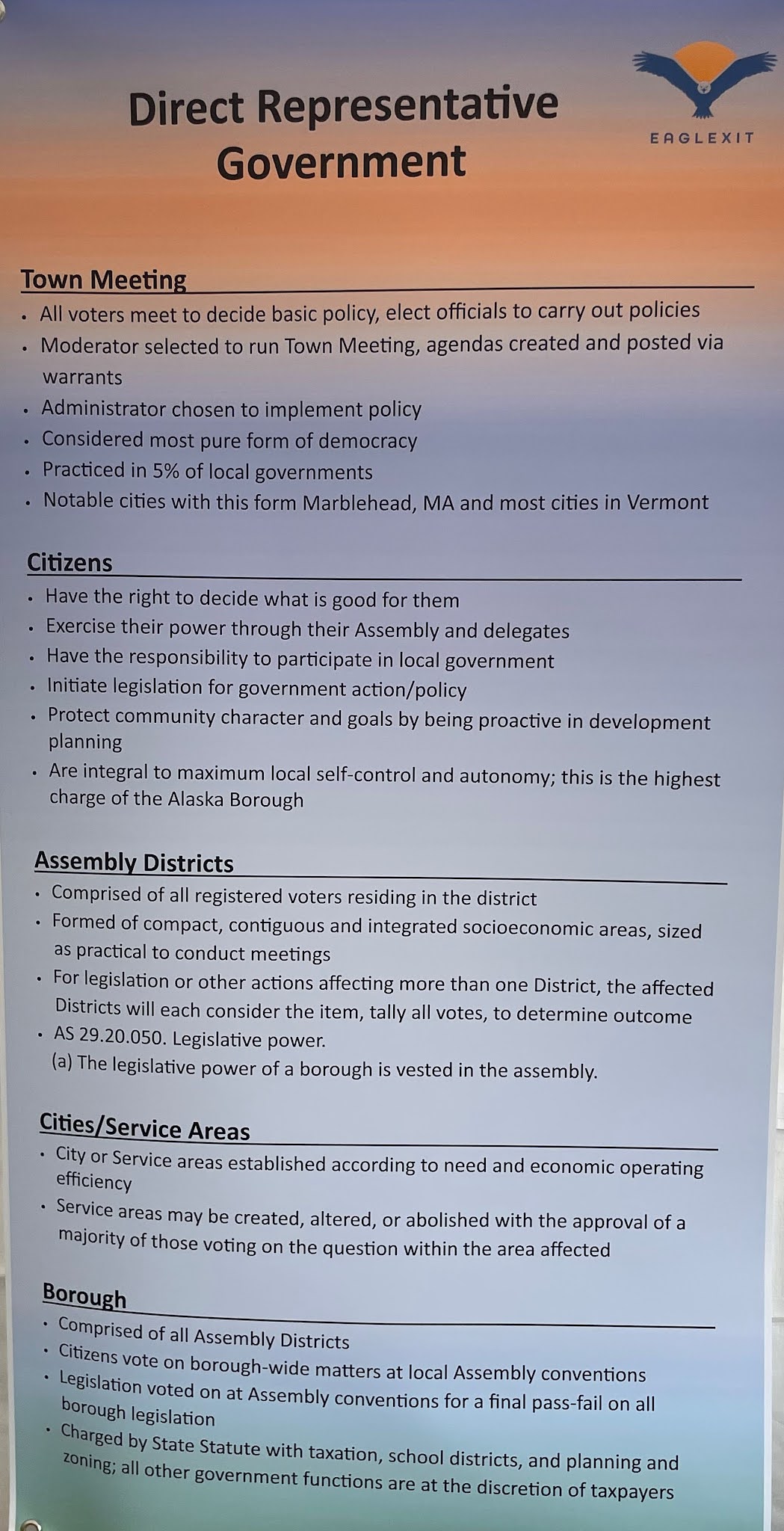
We did a preliminary survey back in 2019 with great results: 75% of the community liked the idea of detaching from Anchorage and forming our own local government, continued Tavoliero. I think it is a prudent thing; then couple that with the possibility of public-private partnerships for municipal operations for local services, and perhaps we have no municipal employees! Labor is perhaps the most intense expense for local government in Alaska. When those costs are reduced and service remains potent, the entire community benefits.

Advantages?
No payroll. No taxes, no need for any kind of local government infrastructure outside of the necessary infrastructure of the community—no Parks & Recreation Department scandals[1] because those services are run by a private entity, said Travoliero. Of course a private entity can be corrupt, but it will be up to the community to decide whether it works or not. For many people in AD2, the Parks & Recreation Department scandal is the tip of the iceberg. It is a demonstration of how large local governments are susceptible to graft and corruption.
I am personally struck by the notion expressed by some that detachment from the Municipality of Anchorage–which was once the City of Anchorage before it became a contentious part of the Greater Anchorage Area Borough–is somehow radical. The Muni is now a reactive government body trying to deal with mammoth problems in the mudflats while the outlying areas largely fend for ourselves, anyway.
Can we create a lean and mean local government?
Imagine this: We are considering is the idea of abolishing property tax, said Travoliero. If we can do that successfully, we will take out a counter-productive form of taxation.
How do we pay our property taxes? None of us voluntarily says to the Muni: “Here’s the check,” continued Travoliero. For the majority of us that tax is hidden in our mortgage payment, and we never know the difference. On the other side of the coin, the elderly who own their homes outright always have the concern that if they cannot pay their property taxes they could be foreclosed on. That economic situation is real to the elderly.
Tavoliero continued: But young people also experience the impact of property taxes. Without property taxes those who want to get into the housing market can have a better debt-to-income ratio and can come into the housing market at a more efficient level. Can a local government accomplish while still providing all its services and programs efficiently and effectively? That is where our community needs to examine the potentials and decide if such a change will benefit our children. From my perspective, our system of local government is failing miserably, perhaps another model may be the answer to our community’s success.
Is this pie-in-the sky?
So how are we going to pay for everything, right? continued Travoliero. That, too, will be for the community to decide. Perhaps through user fees. How do we pay for our electricity, our gas, our snow plowing? We pay for what we use. Under the Town Hall system everybody comes together as a group and decides; this is what we are going to pay for parks and rec, this is what we are going to pay for education. We become educated citizens and make informed choices. Isn’t this better than being told what to do?
This effort seems to be idealistic and dependent upon residents of AD2 stepping up to the responsibility of self government. I believe Mr. McLane would say: You guessed ‘er Chester.
References:
[1] Our ASD Public Education Challenge, DONN LISTON, March, 2021.
https://donnliston.net/2021/03/our-asd-public-education-challenge.html
[2]Municipality of Anchorage Parks & Recreation Dept scanfdal
Anchorage audit finds management set ‘culture of excess’ in Eagle River Parks and Rec division
Author: Emily Goodykoontz
Updated: July 10
Published July 9
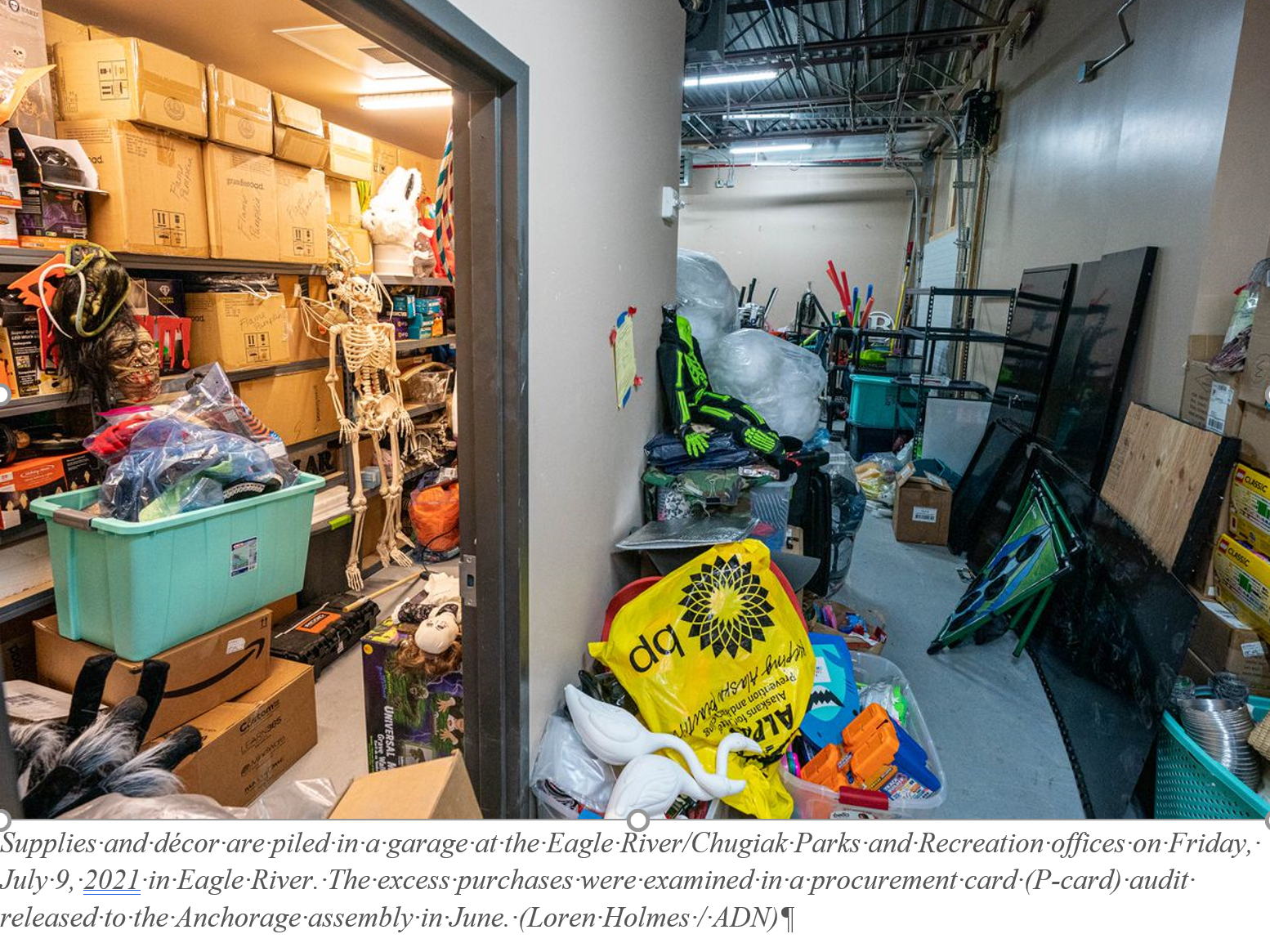
A recent Anchorage internal audit of city spending at the Eagle River/Chugiak Parks and Recreation Division found what the report describes as a “culture of excess” set by the division’s management, prompting a human resources investigation.
The division’s manager, who is on administrative leave, said in an interview Friday that she disagrees with most of the audit’s findings.
Questionable spending included more than $12,300 for a 2020 Halloween party, “Boo at the Beach,” that didn’t actually happen due to COVID-19, as well as spending on supplies for canceled summer camps, the audit said.
At one point, auditors opened a closet where staff thought no division items were stored, to discover swim toys and games including a “Chicken Fight Pool Game,” a “Jumbo Inflatable Derby Duck” and “Shark Tail Blankets.” Staff didn’t know why the toys were bought or what they were for, according to the audit.
Multiple purchases of decor and supplies for the Beach Lake Lodge also seemed excessive, according to the audit, which was published June 10.
“By and large, after reviewing the Division’s P-Card purchases and physically visiting the Division’s facilities, it appears that the tone set by the Division’s management is a culture of excess,” the audit said.
The audit details numerous issues within the department, including questionable purchases and incomplete or inaccurate records of transactions.
Most of the questionable purchases were made by Karen Richards, the division’s manager.
Richards, who said she has managed the division since 2012, is on administrative leave and her city-issued charge card has been canceled.
Richards said she takes issue with most of the audit’s findings and said she was not given the opportunity during the auditing process to address questions or concerns, or explain findings.
“I have a huge problem with that,” she said.
Others in the division made questionable purchases as well, said Mike Chadwick, Internal Audit Department director.
“The thing that struck us the most was the number of purchases that were made — not that they were all necessarily bad purchases — and the unplanned nature of the purchases,” Chadwick said.
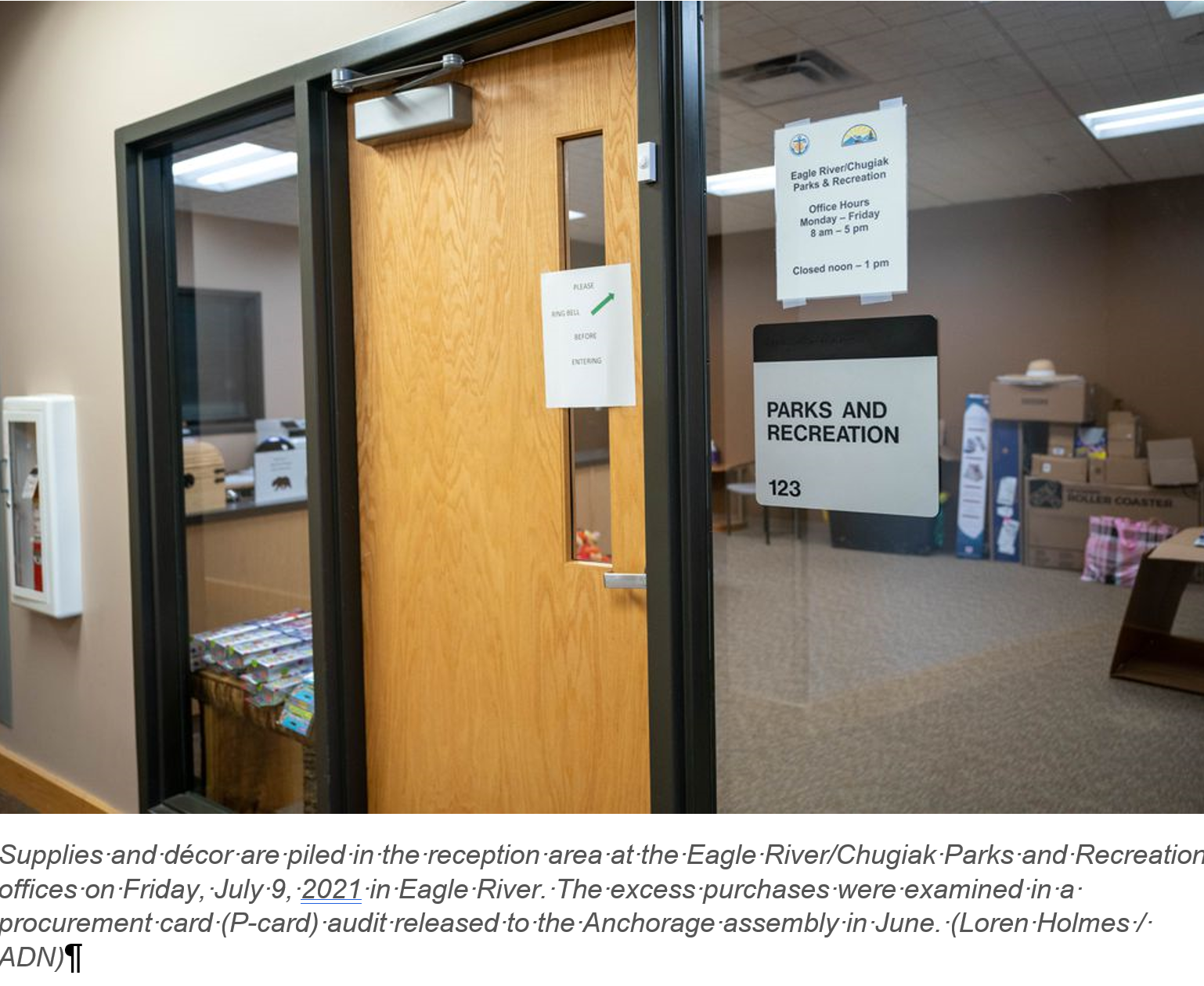
Inside the Eagle River Parks and Recreation Division’s garage on Friday, bins, boxes and items such as Halloween decorations spilled from a storage closet into the hallway, lining either side. Cans of expired paint were piled in an area with the overflow of items, blocking an exit. In the division’s reception area, cardboard boxes and supplies were stacked against a wall.
The audit examined procurement card, or P-card, purchases made by department personnel between January 2020 and February 2021. A P-card is a charge card, similar to a credit card, given to some municipality employees. Employees then can purchase supplies and services for city operations.
[Faith-based Anchorage women’s shelter sues city over changes to LGBTQ anti-discrimination law]
The issues came to light when auditors conducting the annual review of the municipality’s procurement card purchases noticed someone had spent thousands of dollars on supplies for events that had been canceled due to the pandemic, said Scott Lee, principal auditor with the city’s Internal Audit Department.
It prompted city auditors to take a closer look, he said.
“It’s alarming, to say the least,” Anchorage Assembly member Jamie Allard said of the audit during a June Assembly meeting.
Auditors found purchased goods stored in a disarray between multiple rooms, hallways, closets, a garage, horse stables and other areas, without being catalogued. Previously purchased supplies had not been inventoried; inventories are necessary to determine what supplies are needed and to ensure items are not missing, the audit said.
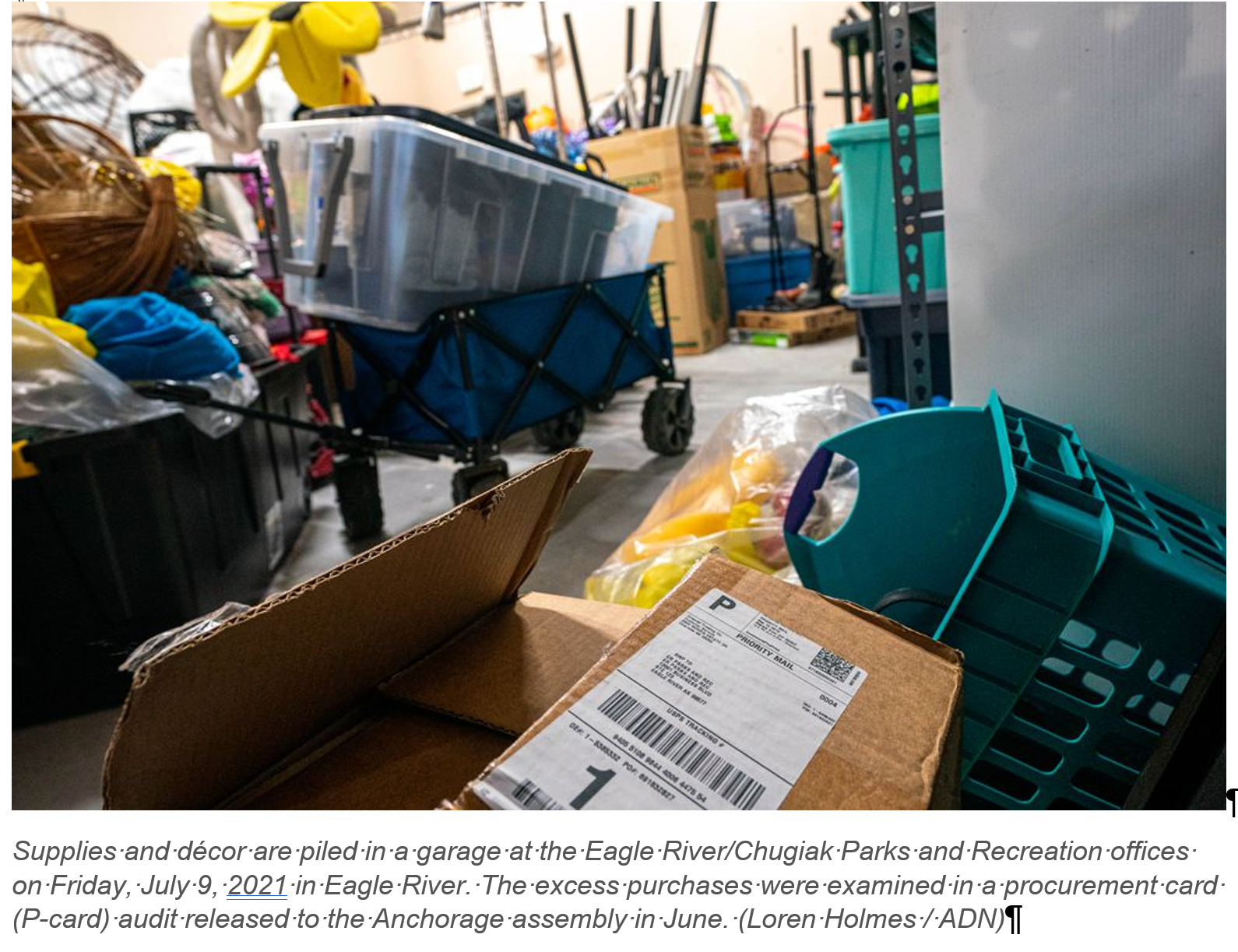
Auditors were told that purchased items appeared unexpectedly without a “clearly communicated purpose,” the audit said.
Richards said she had in place a five-year plan to build out parks and recreation programs and activities in Eagle River. Many of the items she purchased were for that purpose, she said. She purchased items for summer camps with the intent to use them in another program if the camps were canceled.
“I feel that I’ve done a cost savings to the municipality in the years that I’ve been there, so this is hurtful to me,” she said. She said she has worked for the city for about 27 years.
Proper storage has been an issue for the division since the 2018 earthquake, she said. The pandemic made the situation worse because teams could not work together in person to better organize, and the division’s plan to build a new warm storage facility was delayed by a year, she said.
The audit said the issues in the division point to little accountability for spending. The system allowed personnel with P-cards, such as Richards, to review and approve their own purchase transactions, according to the audit, and card transactions were also approved by subordinates, it said.
Allard, who represents Chugiak/Eagle River, called for further investigation.
“Sometimes when audits reveal certain things, it leads into other concerns of fraud, waste and abuse, and those issues have to be addressed too,” Allard, who is on the city’s audit committee, said Thursday in an interview.
“Where there’s smoke, there’s fire,” she said. “So that’s a concern — it’s like the tip of the iceberg.”
[Winner Creek Trail hand tram in Girdwood unlikely to be reopened, officials say]
A formal investigation by human resources was initiated on June 14, Parks and Recreation Department Director Josh Durand told the city’s audit committee at a June 30 meeting.
“I do think the outcome of the HR investigation will be influential as it relates to the cure,” he said.
Still, the department has taken some actions already, he said.
After the “offending” P-card was canceled, “all questionable and recently procured items have been returned,” Durand said.
Other fixes include cataloguing the division’s supplies and changing the division’s P-card policy so that the division manager no longer has a P-card and that employees do the purchasing, he said.
Durand said he was not aware of the issue before the audit. The Eagle River division spent $67,000 on operating supplies in 2020, leaving
$16,000 on the table, which seemed about right during the pandemic, he said.
David Spiess, deputy purchasing officer for the city, said he was “totally shocked” by the revelations in the audit.
“As long as I am sitting in this chair as a purchasing officer, that person will never get a P-card again as far as I am concerned,” Spiess told the committee.
Crystal Kennedy, another Assembly member representing Chugiak/Eagle River, said the audit is a red flag that begs further questions.
“If it was that bad for something as simple as P-cards, what else was probably not handled properly?” Kennedy said. “That’s my bigger question. What else is out there that we need to get to the bottom of that has created this culture of excess?”
Daily News photojournalist Loren Holmes contributed to this report.
About this Author
Emily Goodykoontz
Emily Goodykoontz is a reporter covering Anchorage local government and general assignments. She previously covered breaking news at The Oregonian in Portland and was an intern reporter at the Eugene Register-Guard before joining ADN in 2020. She earned her degree in journalism from the University of Oregon. Contact her at egoodykoontz@adn.com.


